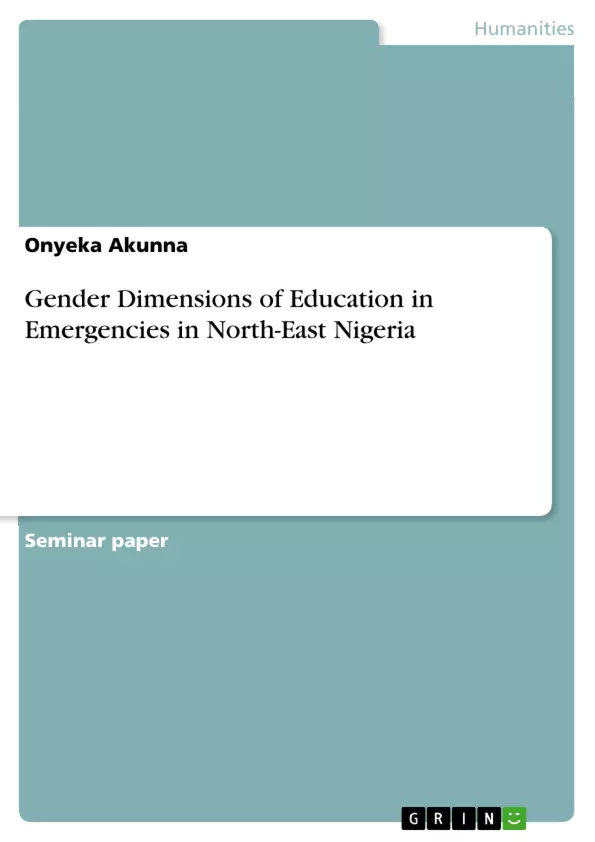This essay investigates the gendered dimension of education interventions delivered in northeast Nigeria and its impact on sustainable peace in the region. This essay puts the focus on the less recognized effects of the Boko Haram conflict on boys’ education. It argues that addressing boys’ vulnerability in this conflict context by investing in their learning through peacebuilding education approaches is an essential part of a response to education and peace challenges in Northeast Nigeria. In this regard, the essay utilizes the critical themes in the field of education and conflict studies – education as a victim and education as an accomplice in discussing the nexus between the conflict and boys’ education in Northeast Nigeria and discusses how peacebuilding education can be relevant in engaging boys in this context.
Inhaltsverzeichnis (Table of Contents)
- 1.0 Introduction
- 2.0 Contextual Background: The Interactions between Education and Boko Haram Conflict in Northeast Nigeria with a focus on Boys' Education
- 2.1 Education as a Victim
- 2.2 Education as an Accomplice
- 3.0 Peacebuilding Education
- 4.0. Peacebuilding Education Approaches for Advancing Boys' Education in Northeast Nigeria
- 5.0 Conclusion
Zielsetzung und Themenschwerpunkte (Objectives and Key Themes)
This essay investigates the gendered dimension of education interventions delivered in northeast Nigeria and the impact on sustainable peace in the region. It focuses on the impact of the Boko Haram conflict on boys' education and argues that investing in their learning through peacebuilding education approaches is essential for addressing education and peace challenges in Northeast Nigeria.
- The impact of violent extremism on education in northeast Nigeria
- The specific challenges faced by boys' education in the context of the Boko Haram conflict
- The role of peacebuilding education in addressing the needs of boys and promoting sustainable peace
- The critical analysis of education as a victim and an accomplice of conflict
- The importance of non-formal education approaches in emergency contexts
Zusammenfassung der Kapitel (Chapter Summaries)
The introduction provides a global context of education in conflict settings and highlights the specific challenges posed by the Boko Haram conflict in northeast Nigeria, particularly for boys' education. The essay then discusses the Boko Haram conflict's impact on education, exploring how education has been both a victim and an accomplice in the conflict. The chapter examines the ways in which the conflict has disrupted education and social services and how it has led to the recruitment of both boys and girls.
The essay then delves into the concept of peacebuilding education and its potential to address the needs of boys in this conflict context. It examines the transformative role of peacebuilding education in developing critical thinking skills and engaging with conflict-inducing ideologies. Finally, the essay proposes practical peacebuilding education initiatives that can be implemented to advance boys' education and promote sustainable peace in the region.
Schlüsselwörter (Keywords)
The essay focuses on education, conflict, peacebuilding, gender, boys' education, northeast Nigeria, Boko Haram, violent extremism, non-formal education, education as a victim, education as an accomplice, sustainable peace.
Frequently Asked Questions
How does the Boko Haram conflict affect education in Northeast Nigeria?
The conflict has severely disrupted social services and led to the destruction of schools, making education a victim of violent extremism.
Why does the essay focus specifically on boys' education?
Boys' vulnerability in this conflict is often less recognized; they face specific risks like forced recruitment and ideological radicalization.
What is meant by "education as an accomplice" in conflict?
This concept explores how certain educational structures or contents might inadvertently contribute to conflict-inducing ideologies or social divisions.
What is peacebuilding education?
It is a transformative approach designed to develop critical thinking skills and engage youth in peaceful dialogue to counter violent extremism.
Can non-formal education help in emergency contexts?
Yes, the essay argues that non-formal peacebuilding initiatives are essential for reaching boys in conflict zones and promoting sustainable peace.
- Arbeit zitieren
- Onyeka Akunna (Autor:in), 2020, Gender Dimensions of Education in Emergencies in North-East Nigeria, München, GRIN Verlag, https://www.grin.com/document/1254910



